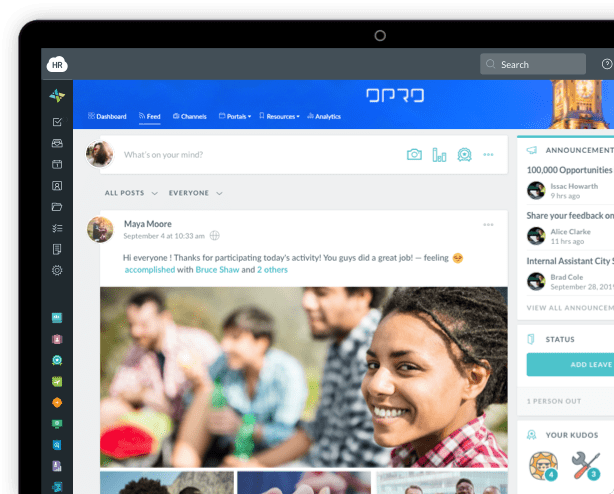Remote Working: The New Norm and Its Impact on HR Productivity

- The Enduring Change: Why Remote Work Continues to Thrive
- Case Studies and Statistical Evidence:
- Redefining Recruitment for Remote Work
- Innovative Evaluation Tools:
- Virtual Onboarding: Building Connections from Afar
- Enhanced Onboarding Programs:
- Keeping Remote Employees Engaged and Communicated
- Employee Well-being Programs:
- Leveraging HR Technology for Remote Workforce Management
- Technology Solutions:
- Future-Proofing HR Strategies
- Legal and Ethical Considerations:
- Conclusion: Thriving in the New Norm of Remote Work
The landscape of traditional workplace dynamics has dramatically altered, with remote working taking a front seat in operational strategies across the globe. This trend, significantly accelerated by the COVID-19 pandemic three years ago, has persisted and even grown, despite the return to normalcy. Employees and employers alike have tasted the flexibility and balance that remote work offers, and many prefer this model over the traditional in-office approach. For HR professionals, this enduring change necessitates innovative strategies to ensure productivity and employee satisfaction remain high.
The Enduring Change: Why Remote Work Continues to Thrive
Remote work, propelled into the mainstream by necessity during the pandemic, has proven its worth as a viable long-term option. Businesses have noted increased productivity, lower operational costs, and improved work-life balance for their employees — benefits too valuable to disregard with the waning of the health crisis. This preference for a flexible working arrangement continues to influence hiring, onboarding, employee engagement, and performance management processes.
Case Studies and Statistical Evidence:
Several companies have successfully transitioned to remote work, showcasing notable improvements in employee productivity and satisfaction. For instance, a recent survey indicated that companies allowing remote work observed a 25% lower employee turnover rate compared to those with strict in-office policies. Furthermore, businesses like 'TechForward' have documented a 30% increase in overall productivity after shifting to a remote model, underscoring the effectiveness of this arrangement.
Redefining Recruitment for Remote Work
The sustained preference for remote work has necessitated a rethinking of recruitment strategies. HR professionals are now leveraging technology-driven methods, focusing on online employer branding, and utilizing social media and professional networks to source talent globally.

Innovative Evaluation Tools:
The challenge lies in assessing candidates without traditional in-person interactions, requiring innovative evaluation tools that consider a candidate's remote work competencies, such as digital proficiency, communication skills, and self-motivation. For example, HR departments are now implementing AI-driven assessment platforms that analyze a candidate’s job performance potential and cultural fit through virtual simulations and assessments.
Virtual Onboarding: Building Connections from Afar
Effective onboarding is crucial, even more so with remote employees who miss out on the in-person welcome experience. HR professionals are tasked with replicating this sense of connection and belonging in a virtual environment. This involves digital welcome packages, remote introductions to team members, and consistent communication from managers and HR.
Enhanced Onboarding Programs:
Investing in comprehensive, interactive onboarding programs helps new hires assimilate the company culture, understand their role, and quickly become productive members of their teams. These programs include virtual office tours, online training sessions using AR and VR for immersive learning experiences, and digital 'buddy systems' to pair new hires with seasoned employees.
Keeping Remote Employees Engaged and Communicated
Maintaining high engagement levels is paramount in a remote setup where isolation is a common challenge. HR needs to drive initiatives that foster a strong sense of community, involving regular virtual team interactions, digital wellness programs, and consistent communication regarding organizational developments, and employee appreciation efforts. Recognizing and celebrating the hard work and dedication of our team members can go a long way in boosting morale and strengthening the bonds within our remote workforce.
Social Intranet Software that Encourages Employee Communication

Employee Well-being Programs:
Companies are increasingly recognizing the importance of employee mental health and well-being, implementing programs like online counseling sessions, virtual group fitness challenges, and webinars on topics like stress management and digital detox strategies. These initiatives help in maintaining a healthy and engaged remote workforce.
Leveraging HR Technology for Remote Workforce Management
The continuation of remote work trends underscores the need for advanced HR technology. Systems that support real-time collaboration, virtual training, and digital HR processes are no longer optional but necessary.
Technology Solutions:
HR professionals must select platforms that automate administrative tasks, provide analytics for informed decision-making, and ensure data security, especially when handling sensitive employee information remotely. Implementing emerging technologies like blockchain can contribute to secure and immutable record-keeping. Additionally, utilizing password managers and VPNs further enhances the overall cybersecurity framework, ensuring a seamless and protected environment for handling HR responsibilities. Meanwhile, AI-driven analytics tools play a crucial role in monitoring employee engagement and productivity patterns, facilitating more effective management practices.
Future-Proofing HR Strategies
As remote work solidifies as a standard business practice, HR professionals must stay ahead of the curve, adapting policies and strategies to support an evolving workforce. This involves nurturing a culture of continuous learning, providing access to virtual professional development programs, and ensuring employees have the skills needed to thrive in a digital work environment.
Legal and Ethical Considerations:
With the rise of remote work, companies face new legal and ethical challenges, including compliance with different state or even international labor laws, data protection regulations, and ensuring equal opportunities and fair treatment for all employees. HR departments need to collaborate closely with legal experts to navigate these complexities, developing comprehensive policies that consider diverse scenarios employees might encounter while working remotely.
Conclusion: Thriving in the New Norm of Remote Work
Remote work, once a temporary solution, is now a defining feature of the global workforce. HR professionals play a critical role in ensuring that companies can navigate this shift successfully. By embracing advanced technology, adapting to new recruitment and management strategies, and fostering a culture of connectivity and continuous improvement, HR can lead the way in maximizing the benefits of remote work. The ultimate goal remains clear: a resilient, engaged, and productive workforce that thrives, irrespective of physical location.
Author Bio:
Samantha Clark is a Warrington College of Business graduate and she works for the professional accounting firm, ThePayStubs. She handles all client relations with top-tier partners and found her passion in writing articles on various finance and business-related topics.
Keep Reading
Balancing Technology and the Human Touch in Employee Engagement
Companies are taking employee engagement very seriously because it is one of the ways of
Building Strong Teams: The Power of Team Bonding Exercises
Never overestimate the power of collaboration as a core element of effective team

